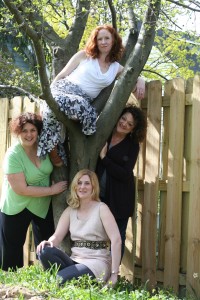
They say that necessity is the mother of invention. And they, whoever they are, were right.
What were we waiting for? That was the recurring question that finally demanded an answer the summer of 2010 for myself and a group of close friends and artistic collaborators who would become the co-founders of Mamaí Theatre Company. Mamaí (pronounced mah’ may) is the Gaelic word for “mother.”
For years I would lunch or dine or w(h)ine with Bernadette Clemens, Derdriu Ring and Wendy Kriss and after getting caught up on our personal lives, our children, our work, our talk turned to our artistic lives. Looking back it’s easier to connect the dots of this decade-long conversation: why are there fewer auditions for women? Why are so few women directing? Why is no one producing classical theatre? Where are the plays we studied in college? Our children are growing and beginning their transitions out into the worlds while we are sitting on experience, training, and desire. We live in an area with tremendous support for the performing arts. It is time to make our own work. “Don’t wait, create” became our mantra.
For Clemens, most important were two conditions in Northeast Ohio that she wanted to remedy: “a lack of classical plays in production that we very much wanted to buy tickets to or work on as artists—plays that are important and marvelous and done elsewhere in major cities around the world, yet not here; and an economic recession that caused fewer productions per season in the area, safer play choices by producers, and thus fewer roles for women in a field that already weighs heavily towards available work for men over women—a condition exacerbated by the passing away, relocation or retirement of several active professional women directors in the area. It was high time that someone started producing intelligent, relevant classical theatre, and it was high time that we filled the gap for hiring Equity and Non-Equity women in Northeast Ohio professional theatre at a time when more than 15 Equity women and dozens of Non-Equity women would line the walls at auditions and sometimes callbacks for a single job available in a female role.”
I also shared Bernadette’s frustration, as well the impetus to further my directing experience. I’ve been working with children and teens for two decades and was feeling ready to begin to work on pieces with smaller casts and more mature material in a professional setting. I’d also been travelling to Lenox, Massachusetts the past few summers to study with Tina Packer at Shakespeare & Company. A few summers ago I’d made a special trip to see all five installments of her current Off-Broadway hit production “Women of Will,” in which she traces the arc of Shakespeare’s writing of female characters, from virgins to viragos. There was my teacher, a septuagenarian doing her thing with wild abandon and joy; what was I waiting for?
And so, in the summer of 2010, on a very hot and sticky July evening, on a front porch in Cleveland Heights, Mamaí Theatre was born. Our first project was a short Samuel Beckett piece, “Come and Go,” for Cleveland Public Theatre’s annual extravaganza, Pandemonium. We followed up with a performance at CPT’s new works in progress series, Big Box, which was a devised piece deconstructing Irish playwright John M. Synge’s “Riders to the Sea” and fused with LeCoq Clown technique and the corporeal mime work of Etienne Decroux, teacher of Marcel Marceau, with whom Wendy had studied in Paris. A two-year strategic plan followed that included everything from research to planning to play readings with professional actors at private homes and Playhouse Square’s Idea Center.
In 2012 we were ready to launch. Thanks to a generous space grant from Ensemble Theatre, which is now housed in the Coventry Commons (the former Coventry Elementary School), Mamaí Theatre Company is in residence in its inaugural season which opens in June with a U.S. premiere of Brendan Kennelly’s translation of Euripides’ “Medea,” directed by Bernadette, followed by my production and a Northeast Ohio premiere of David Mamet’s “Boston Marriage.”
Mamaí Theatre Company finds contemporary relevance in new conceptions of classical theatre. “Medea” is a classical Greek tragedy but Bernadette’s vision for it is decidedly contemporary. “Boston Marriage” is a contemporary play but it is also a period piece.
“The impulse and instinct to direct ‘Medea’ is the one that remained constant for me,” said Clemens, co-artistic director Clemens. “I was strongly influenced in Dublin in 2004 by the debut of Seamus Heaney’s “The Burial at Thebes,” a contemporary rendition of “Antigone.” Heaney’s translation is electric and the world of the play is now,” said Clemens. “The language flew from the page through the artists to our guts in the Abbey Theatre audience. It was the essence of why we, all over the world, still produce classical theatre in the 21st century—because it’s good theatre, and because the playwrights’ words, in a sense, could have been written today. In that spirit, turn on CNN to look at the redundant headlines about mothers (and fathers, speaking of universality) in our country who have tragically murdered their young children lately, and you’ll know why Medea remains relevant today. It’s because we are all Medea. We live in a society where this could happen, where it does happen, and I want to ask: Why? How could someone do this? It seems unfathomable, and yet it is 2,500 years after Euripides wrote it, and we’re still doing it.
Brendan Kennelly’s publisher and permissions holder is thrilled that Mamaí Theatre Company is staging a contemporary conception of Mr. Kennelly’s volatile translation. He wrote it in the 1990s based on the women he met during an earlier stay in St. Patrick’s Psychiatric Hospital in Dublin. Mr. Kennelly’s publisher has given us permission for the United States professional premiere, as well as permission for directorial shifts, such as Medea’s and Jason’s children being girls, rather than boys.”
My love affair with “Boston Marriage” began in 2006 when I saw Derdriu Ring in a production at the Pittsburgh Irish & Classical Theatre Company. I’d seen theater in London, New York, and many other places around the country and the world, and I thought to myself, every Mamet play has been done in Cleveland except this one, and I wondered why. The only reasoning I could come up with is that because the three roles are all women, and the prevailing mentality in town is that if the work is sophisticated then those roles would have to go to Equity actresses (because how could a non-AEA actress have the chops?), which then must be a matter of finances.
Needless to say this was totally unacceptable. The play is also wickedly funny, written in the style of Oscar Wilde but with real physical comedy. It is part farce, part mystery, full of wit and linguistic gymnastics. And those well-behaved women rarely making history that you’ve heard about? You’ll find them here, busy wreaking havoc subversively inside a discreetly disguised Victorian drawing room comedy. It’s as if old Lady Bracknell were transported to the 21st century and all of her repressed energy were suddenly unleashed. Underneath the corsets is the driving, aggressive, intellectual and sexual energy of any of Mamet’s male protagonists.
So here we are, heading into rehearsals this month and inviting you to be a part of our journey. Theatre doesn’t exist without the final collaborator: you, the audience. Please join us. Tickets are on sale now. Don’t wait, create. www.mamaitheatreco.org.



Leave a Reply